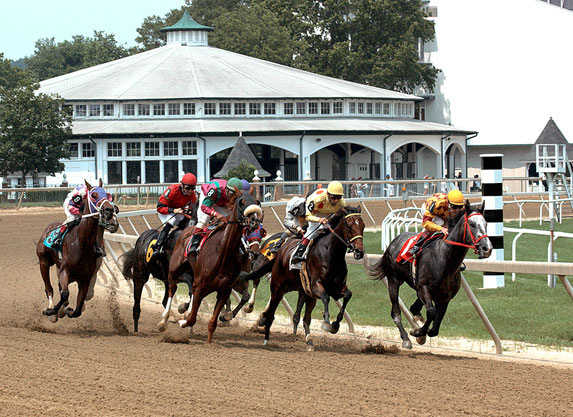By T. D. Thornton
Tracks and horsemen's associations in Maryland, Delaware, Pennsylvania, and New Jersey have united to reignite the Mid-Atlantic Thoroughbred Championships (MATCH) series in 2018, a May-through-September regional schedule of races that will feature a $450,000 bonus pool for owners and trainers atop a $2.9 million stakes structure.
The MATCH Series previously existed in a similar format for five years starting in 1997, but disputes over purses and conflicts with racing dates derailed the series.
Alan Foreman, the creator of the MATCH concept and chairman of the Thoroughbred Horsemen's Association, cited ownership changes at many of the region's tracks and a new, collective spirit of unification in the face of declining horse populations as catalysts for reviving the series.
The purses for the stakes will be paid out of each track's respective purse accounts. Horsemen have agreed to put up $450,000 for the bonus pool. Tracks will be responsible for the administration and advertising costs. The exact amount that each entity contributes is based on a sliding scale, Foreman said.
“[The tracks are] doing it at different levels. It's not 'same size fits all,'” Foreman said. “And on the horsemen's side, it's the [various regional] THA groups and the Pennsylvania HBPA, and each group is contributing at a different level because we're not all similarly situated insofar as our purse accounts are concerned. At Delaware and Monmouth, the horsemen are far more challenged than they might be in Maryland or Pennsylvania. But that $450,000 bonus pool is coming from the horsemen's organizations, and that's the engine that drives the series.”
Horses competing in the MATCH series will earn points based on participation and order of finish, and the leading points earners in each of the divisions, as well as the overall owner and trainer points leaders, earn bonus money.
The 2018 series will be contested among five divisions, with five races for each division, at Pimlico Race Course, Laurel Park, Monmouth Park, Delaware Park, Penn National, Parx, and Presque Isle Downs. The complete schedule and rules can be viewed here.
The first, second and third-place owners, respectively, in each division will earn $20,000, $15,000, and $10,000. The top three earning trainers will earn $15,000, $10,000 and $5,000, respectively. The MATCH series overall top-earning owner will win $50,000, while the top-earning trainer will earn $25,000. Previous series winners included trainers H. Graham Motion and Ben Perkins Jr., and owners Arthur Appleton and Sam Huff.
Foreman said there had been attempts in recent years to revive the MATCH series, most notably in 2014, when the various entities came “very close” to doing so. This past fall, when representatives from tracks and horsemen's groups held an annual meeting to discuss regional strategies, MATCH talks began in earnest, with commitments crystallizing in December.
“The tracks took the position that for the series to be successful, it requires the bonus pool, and that [means] financial contributions from the horsemen's organizations,” Foreman explained. “And so [it was discussed that if] the horsemen's organizations would commit to the bonus pool, the tracks would take a serious look at funding it from their side; they have historically provided the funding for marketing and promotion.
“And then we had to get the racing directors together to see if it was possible to coordinate a series in terms of what would be the best divisions and whether the tracks would agree to put the puzzle together by not scheduling [conflicting] races on top of series races,” Foreman continued. “From the horsemen's perspective, it was important to have a road map for the length of the series and [to know] that the tracks wouldn't be fighting for horses because they were competing against each other.”
Asked to pinpoint a specific change that helped to bring MATCH back, Foreman cited the turnover in track ownerships.
“One of the things is that the ownership groups of all the tracks, except for Delaware Park, have changed. So we're dealing with different ownership groups, some of whom are more progressive than their previous ownerships and are starting to think outside the box on what's going to be necessary for this industry to move forward,” Foreman said.
“Everyone who came to the meeting had to put aside whatever agendas they had if they wanted the series to go forward. Because if that didn't happen, or if the horsemen were not willing to take money from their purse accounts for that bonus pool that drives the series, this wasn't going to work,” Foreman said. “And if the tracks didn't think that they could move races, or card a new race, this wouldn't have happened. And in every instance nobody said no, so we were able to go ahead each step of the way.”
Foreman also said that in terms of marketing and promotion, another big change is the now-ubiquitous presence of the internet and social media, which were only in nascent forms when MATCH last existed.
“Compared to today's world, it was the Dark Ages,” Foreman said. “This time, we're going to be able to do most of our marketing and promotion on the internet and through social media. We'll be able to pop that stuff out for a lot less money. We're going to be lean and mean. We're going to demonstrate that there's value in this series, and then we'll try and build on it. “
Not a subscriber? Click here to sign up for the daily PDF or alerts.






